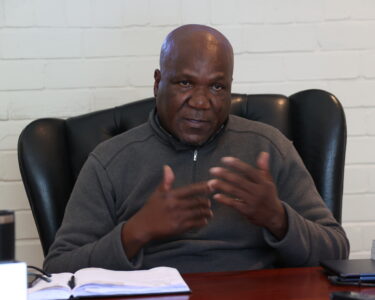Ever met someone who oozes a lot of confidence, is talkative and is blessed with boundless energy, you begin to wonder where all the vibe is coming from? Our Editor-in-Chief, Munyaradzi Huni, came face-to-face with Maxwell Zulu, the resident engineer at Thuli-Manyange Dam in Matabeleland South and was charmed by his passion for his job.
The construction of Thuli-Manyange Dam in Gwanda District in Matabeleland South has suffered so many false starts, dating back to the 1950s. Even as the Brick by Brick magazine team recently visited the dam site, construction of the dam had been suspended but Engineer Zulu was nevertheless oozing with confidence that under the Second Republic, the dam will certainly be completed.
There is no reason to doubt Engineer Zulu. The man has seen it all. He worked on not less than three mega dam projects — Osborne Dam in Manicaland, Bubi-Lupane Dam in Matabeleland North and Tokwe-Mukosi Dam in Masvingo. “Water is all I know in my professional life,” says the man who prefers to call himself Mr Waterman.
In addition, the Second Republic poured in US$43 million last year to expedite the project that will go a long way in alleviating water problems in drought-prone Matabeleland South. Thuli-Manyange Dam is one of the national projects which demonstrates the Second Republic’s commitment to investment in strategic water bodies throughout the country.

‘No need to despair’
Before chronicling the long history of Thuli-Manyange Dam, Engineer Zulu put things into perspective. “There are three parties to the project: the Government of Zimbabwe (the client); China International Water and Electric Corporation (CWE), the contractors; and the Zimbabwe National Water Authority (ZINWA), who are the engineers in charge of monitoring the project.
“I was here when this project started in earnest in April 2021 and I can assure Zimbabweans in general and the people of Matabeleland South in particular that this project will be completed by the Second Republic. The determination that the Second Republic has shown in the construction of this dam and the efforts being put to ensure everything runs smoothly tells me that we are on course. Yes, construction works were suspended on 29 August 2022, but I have been given assurance that money will be availed to finish this project.
“Through my vast experience working at Osborne Dam, Bubi-Lupane Dam and Tokwe-Mukosi, I know these teething problems always crop up. However, the pace at which resources were being availed since we started working here in April 2021 shows me that there is nothing much to worry. We covered a lot of ground under a year and I am sure funds will be availed to finish this project,” says Engineer Zulu.
Thuli-Manyange Dam: A brief history
Thuli-Manyange Dam has a history of unfulfilled promises that date back to pre-independence times. It was mooted by the Rhodesian government but failed to take off due to a number of challenges. Says Engineer Zulu: “Thuli-Manyange Dam is located in Gwanda District, Matabeleland South Province. It’s about 55 kilometres from Gwanda. This is a concrete arch dam that is 33 metres high and has the capacity to store 33 million cubic metres of water. Its main purpose is to provide water for irrigation in this dry region. “The area has very rich soils and very good weather. It has everything necessary for crop production, except water. So it makes a lot of sense to invest in this national project.
“The planning of this project started way in the 1950s. Major investigations and surveys were made around 1974 to establish the suitability of this site. From there on, there were so many false starts to this project. In 2006, a contract was awarded to a contractor to start building the dam but financial constraints hampered the project.
“In 2018, another contractor was awarded the contract to build the dam but, again, the project failed to take off. The challenges persisted until April 2021 when major civil works commenced to build the dam. The contractor, CWE, had mobilised enough funds to start work. All the work that has been done on this site started in April 2021, thanks to efforts by the Second Republic.
“On either side of the river, there are two earth-fill saddle dams. The project involves the construction of irrigation canals on either side of the Thuli River. The left side canal takes water for irrigation to Guyu while the right side will take water to Makokwe Hills where irrigation land has been identified. The project also involves the construction of an all-weather access road about 7 km from the Gwanda-Ntepe road, leading to the site. There are also plans to establish a mini-hydro plant near the site.
“This project is very important for Matabeleland South because it has the capacity to irrigate 1 600 hectares. Thuli-Manyange Dam will be used as a pick-up dam for a major dam, Thuli-Moswa, that will be constructed about 12 km upstream of Thuli River.
“Thuli-Moswa will store about 500 000 mega litres of water. It will be about 15 to 20 times bigger than Thuli-Manyange Dam. The water from Thuli-Moswa Dam will be released into Thuli-Manyange Dam and be distributed. So the construction of Thuli-Manyange Dam is the first phase of this big project.
“As for Thuli-Moswa Dam, feasibility studies have already been done and the site has already been pegged. But as is the mantra of the Second Republic, we are going to construct the dams, one step at a time, brick by brick. I really like the title of your magazine.
“We are doing things ourselves and using our own resources, and so it has to be brick by brick so that we build dams that meet international standards. We know the world is waiting to judge us and so brick by brick is the only way to deliver the best.”

‘This dam will change Mat South forever’
On completion, Thuli-Manyange Dam will serve areas such as Manama Mission; Vela, Guyu, Ntalale, Chelesa and Manama business centres; Sizhubane Barracks; Sebasa and Mankonkoni irrigation schemes.
“Thuli-Manyange Dam will change Matabeleland South completely. I was at Tokwe-Mukosi Dam during its construction and I know how a dam of this magnitude can transform a whole province. If you go and see how water from Tokwe-Mukosi is being utilised, you won’t believe that you are in a dry region. There are sugarcane plantations all over the place.
“If we finish building Thuli-Manyange Dam, I see it contributing immensely to the region. Matabeleland South will go green and I can already visualise it in my mind. This province will contribute significantly to food security in the country. Once we finish Thuli-Manyange dam, the momentum should not die down. We should move to Thuli-Moswa Dam. We have shown already that we can do this.
“Had there been no disruptions, our target was to finish this project in December 2022. The contractor suspended works on 29 August 2022 due to financial constraints. However, by then, we had made significant progress in building the dam. We are very confident that the financial issues will be sorted out soon because the Second Republic is determined to finish the construction of this project.
“At full throttle, the contractor employed over 250 people. ZINWA has about 40 engineers on the ground. So, in total, about 300 people were employed here. At maximum, we should be able to employ over 600 people,” said Engineer Zulu.
Building the pride of Mat South
The engineer said despite the setback, whenever the works resume, they will build a dam that will be the pride of Matabeleland South.
“As the resident engineer, I am very happy with the work by the contractor. We have a laboratory to test everything on-site and so we are doing everything to build a dam that will be the pride of Matabeleland South in particular and Zimbabwe in general. I have worked many years in the water sector and I know the importance of quality in this sector. We can’t afford to leave anything to chance.
“I have been in the water sector all my professional life. At first, I was involved in the planning of the dams then I decided to move out of the office and go to the ground. I studied Civil Engineering and water is all I know. Even my surname Zulu means water and so you can call me Mr Waterman!
“I think my passion to work with water is a God-given gift. It’s actually a calling. At some point, I went to South Africa in search of greener pastures. But after only two days, a thug pulled a knife on me. After this life-threatening experience, I decided to come back home to continue with my waterworks. People underestimate the peace and stability in this country. I am not going anywhere. The waterworks continue here and I am doing just fine,” said Engineer Zulu.



